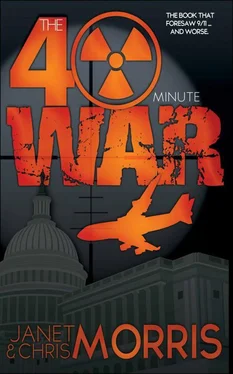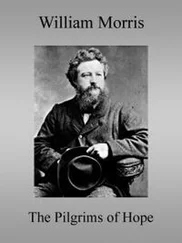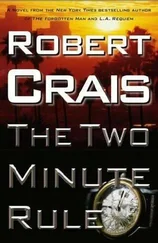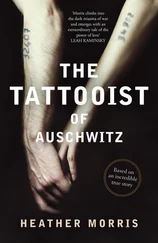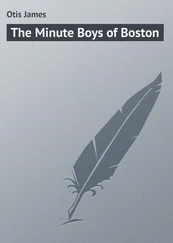Janet and Chris Morris
THE 40-MINUTE WAR
We would like to thank Jim Baen, who read the manuscript in progress and made astute suggestions; David Drake, whose DU rounds came in handy; and Dean Ing, whose up-to-the-minute expertise in the area of nuclear conflict and kind assistance were invaluable.
It was cherry blossom time in Washington and from the air the clever planning of the city’s French architect was clearly visible: no horse army would have an easy time storming revetments well placed along those concentric circles. Capitol Hill and its buildings, as the young nation’s fathers had intended, would be prohibitively expensive to take and the last to fall to an enemy infantry slogging up the slope.
But this was of little concern to the airborne warriors of the Islamic Jihad in their commandeered Royal Saudi airliner. There were only six martyrs aboard—three Iranians, two Libyans, and a Palestinian woman who, despite her sex, was their commanding officer.
Numbers were an extraneous consideration in their battle; so was survival of the warriors. This was as it had always been and it bothered none of the suicide commandos in the big Boeing’s cockpit: they had been chosen by their mullah for just this reason—with, of course, the additional proviso that they be technically capable of performing their mission.
Each one of them was a certified pilot capable of flying the jumbo jet to its rendezvous with history if only one was left alive; all were fluent enough in the dialects and customs of the despicable Saudi moderates and the American Satans to pass for a commercial jet’s crew; each had been drilled and redrilled in the arming and detonation of the tactical nuke they had on board until any one of them could have delivered it to its target from the depths of sleep or death’s door.
It was a simple matter, really, as it had been to commandeer the jetliner without one of its two hundred and fifty-seven passengers suspecting anything: every move they made had been thought out by other, wiser heads far in advance.
The jet wasn’t altered; it bore no rocket launchers under its wings; it needed no complicated targeting electronics or heads-up displays. The martyrs weren’t up to that and their dispatchers knew it—hence the complex and painstaking ruse that assured the complete normalcy, to all appearances, of the final approach of Flight 319 from Riyadh.
What the commandos were capable of doing was vectoring from their approach to Washington International Airport and crashing their jumbo jet into the very lair of the greatest Satan of all: the White House, home of the President of the United States.
The entire operation, from the moment the jet veered from its flight path to the moment it crashed into the White House among a tardy hail of antiaircraft fire from stunned soldiers in nearby emplacements, took fourteen point nine seconds—just long enough for the woman who led the martyrs to let the world know who should get the credit for eradicating its greatest evil in the cleansing fire which the American Satans had so long used to hold the Islamic peoples hostage to its will.
“ Allaho Allam ,” the woman whispered—“God is Great”—just before she armed the suitcase bomb they had with them on the flight deck.
She died smiling, which was more than could be said for the jet’s pilot who, despite his revolutionary fervor, voided in his pants just before he was incinerated as the bomb went off milliseconds before impact.
Her smile was the last smiled around Washington that day in April or for many days afterward, for the terrorist bombing of the White House by the Islamic Jihad had certain unforeseen consequences:
The electromagnetic pulse from the blast knocked out communications in the immediate area and wiped data from a number of computers, including those used by the flight controllers at Washington International, all of whom were killed by debris riding the shock wave radiating from Ground Zero, with the result that the Jihad’s message was never delivered to higher American authorities or anyone else: the Libyans, whose bomb it was, had been a little too zealous, the bomb a trifle overpowered for its purpose.
The President of the United States, who was—fortuitously or not—in Air Force One on his way to deliver a speech to dairy farmers in Wisconsin, received the news that his wife and two young children had been annihilated with something less than aplomb: he got up from his orthopedic leather recliner, bumping a brilliantined head against the luggage compartment, and stormed over to the shocked Air Force officer who had the ill-fortune to be the man carrying the Football—the briefcase containing the codes and electronics to arm and fire America’s nuclear arsenal—that day and snapped, white-faced, “Open it.”
The Air Force officer had no choice but to obey his Commander in Chief.
The other five passengers aboard sat stunned and silent. No one argued that it wasn’t the Russians, that it might be better to wait—the US and the Soviets had long ago given up the option of waiting: the two superpowers maintained a state of readiness called Launch on Warning.
If a nuclear attack on the White House—the President blinked away visions of his wife’s face transported in ecstasy the night before in Lincoln’s bed—wasn’t sufficient warning and clear provocation, the President didn’t know what was.
He bent over the Football, open on the Air Force major’s lap, and did what he’d prayed fervently to God he’d never have to do. President Alexander Claymore was a devout man, a good man—as good as any who runs for so high an office could be; unfortunately for the civilized world, he was also a family man and an ex-military man with a peculiarly military outlook on life, the world in general, and the Soviet Union in particular.
As a family man, he was devastated by his loss. As a military man, he knew that any war was lost as soon as it must be fought—a nuclear war wasn’t that different in theory, just in consequences. As a Soviophobe, he’d always known, in his heart of hearts, that it would come to this.
And he’d promised himself and his wife—might she rest in peace—that if it ever came to this he’d put bullets through both their heads. He squeezed his eyes shut as he straightened up from the instrument of Armageddon called the Football and, through his shirt, the soft inside flesh of his arm brushed the little PPK he always carried in a shoulder holster.
The Air Force major stared at him wanly; when the square-jawed, crew-cut youngster opened his mouth to speak, strings of mucus stretched across his lips: “We’ve still got seven minutes, Sir… to verify… to abort.”
That was true, technically. But Claymore was thinking about the bathroom, the clean finality of a nine-millimeter slug crashing into his brain: he was Commander in Chief, and he’d lost his war. Honor demanded a quick exit. And his wife, sweet Linnie, was waiting. So was little Jenny, and Bobby, his son.
“Verify what , soldier?” Claymore slugged the major with his stare. “It ain’t easy to learn Russian, boy. You think maybe it’s a mistake? That Ivan’ll say he’s sorry?”
“No Sir, I didn’t—”
“—didn’t think . Check.”
Claymore looked around. All of his people were staring at him: the Undersecretary for Agriculture, a pure hayseed with a stain on his chinos he was too terrified to hide; his Press Secretary, a walking mouth without a brain in his head but possessed of an autonomic gift for gab that had been crucial during the campaign; a woman speechwriter who sat quietly, chin up, with tears running down her rouged cheeks like gray worms; a Special Assistant who wasn’t particularly special and now had his knuckles jammed in his mouth; and two Secret Service men who watched everyone else with bleak eyes, ready for any sort of trouble.
Читать дальше
